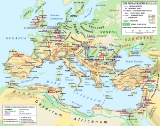
Legio X Fretensis
Overview
Legio X Fretensis was a Roman legion
levied by Augustus Caesar in 41/40 BC to fight during the period of civil war that started the dissolution of the Roman Republic
. X Fretensis is recorded to exist at least until 410s.
X Fretensis symbols were the bull
, the holy animal of the goddess Venus
(mythical ancestor of the gens
Julia
), a ship (probably a reference to the battles of Naulochus and/or Actium), the god Neptune
, and a boar.
Roman legion
A Roman legion normally indicates the basic ancient Roman army unit recruited specifically from Roman citizens. The organization of legions varied greatly over time but they were typically composed of perhaps 5,000 soldiers, divided into maniples and later into "cohorts"...
levied by Augustus Caesar in 41/40 BC to fight during the period of civil war that started the dissolution of the Roman Republic
Roman Republic
The Roman Republic was the period of the ancient Roman civilization where the government operated as a republic. It began with the overthrow of the Roman monarchy, traditionally dated around 508 BC, and its replacement by a government headed by two consuls, elected annually by the citizens and...
. X Fretensis is recorded to exist at least until 410s.
X Fretensis symbols were the bull
Taurus (constellation)
Taurus is one of the constellations of the zodiac. Its name is a Latin word meaning 'bull', and its astrological symbol is a stylized bull's head:...
, the holy animal of the goddess Venus
Venus (mythology)
Venus is a Roman goddess principally associated with love, beauty, sex,sexual seduction and fertility, who played a key role in many Roman religious festivals and myths...
(mythical ancestor of the gens
Gens
In ancient Rome, a gens , plural gentes, referred to a family, consisting of all those individuals who shared the same nomen and claimed descent from a common ancestor. A branch of a gens was called a stirps . The gens was an important social structure at Rome and throughout Italy during the...
Julia
Julius
The gens Julia was one of the most ancient patrician families at Ancient Rome. Members of the gens attained the highest dignities of the state in the earliest times of the Republic. The first of the family to obtain the consulship was Gaius Julius Iulus in 489 BC...
), a ship (probably a reference to the battles of Naulochus and/or Actium), the god Neptune
Poseidon
Poseidon was the god of the sea, and, as "Earth-Shaker," of the earthquakes in Greek mythology. The name of the sea-god Nethuns in Etruscan was adopted in Latin for Neptune in Roman mythology: both were sea gods analogous to Poseidon...
, and a boar.
Unanswered Questions

